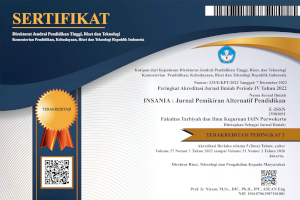Memaksimalkan Perkembangan Kognitif Anak Sekolah Dasar Melalui Pembelajaran Literasi
Memaksimalkan Perkembangan Kognitif Anak Sekolah Dasar Melalui Pembelajaran Literasi
DOI:
https://doi.org/10.24090/insania.v22i2.1221Keywords:
Cognitive Development, Primary School Children, Literacy LearningAbstract
Being able to explore the world around through the five senses is one of the stages of cognitive development that passes through each individual. Then, just how to maximize each stage to get the perfect cognitive ability. Especially in elementary school-aged children, they know more about many things than before, and need good guidance on how to learn from the surrounding environment as a preparation for the next stage of cognitive development. Cognitive or intellectual potential is imposed on the activities of thinking that actually need an intensive effort to maximize it. One that can be done is through literacy learning. Literacy learning at elementary school level is hoped as the process of understanding, the process of reading, the process of writing, and the concept of written analysis that can help to improve their cognitive development. While in the context of education, there are four forms of learning that can be applied, they are learning of literacy reading, literacy learning writing, science literacy learning, learning mathematical literacy.Downloads
References
Crain, William. 2014. Teori Perkembangan: Konsep dan Aplikasi. Yogyakarta: Pustaka Pelajar.
Fathurrohman, Muhammad & Sulistyorini.2012. Belajar dan Pembelajaran.Yogyakarta: SUKSES Offset.
Papalia, Diane E. 2008. Human Development. Jakarta: Prenadanedia Group
Santrock, John W. 2007. Perkembangan Anak. Ditermejahkan oleh Mila Rahmawati dan Anna Kuswanti. Jakarta: Erlangga.
Downloads
Published
How to Cite
Issue
Section
License
Authors who publish with this journal agree to the following terms:
Authors retain copyright and grant the journal right of first publication with the work simultaneously licensed under a Creative CommonsAttribution-ShareAlike License that allows others to share the work with an acknowledgment of the work's authorship and initial publication in this journal.
Authors are able to enter into separate, additional contractual arrangements for the non-exclusive distribution of the journal's published version of the work (e.g., post it to an institutional repository or publish it in a book), with an acknowledgment of its initial publication in this journal.
Authors are permitted and encouraged to post their work online (e.g., in institutional repositories or on their website) prior to and during the submission process, as it can lead to productive exchanges, as well as earlier and greater citation of published work (See The Effect of Open Access).








